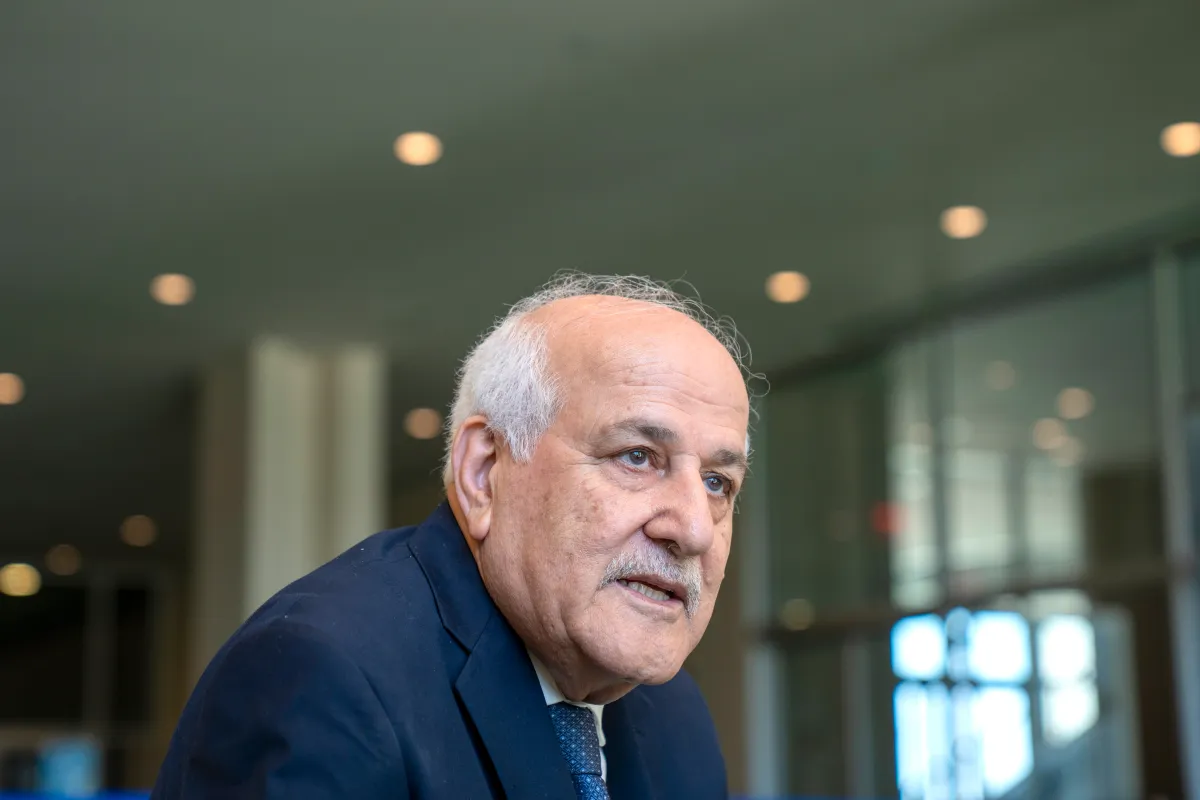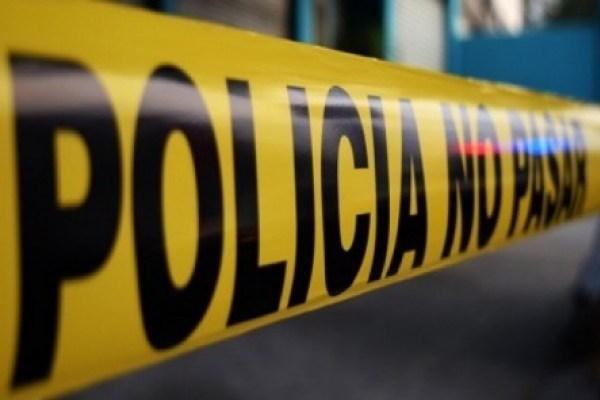International
The Palestinian ambassador to the UN believes that Spain “opened a door that others will follow”

The Palestinian ambassador to the UN, Ryad Mansour, believes that Spain is in the group of “brave countries that opened a door that others will follow,” in reference to the recognition of the State of Palestine, which materializes on Tuesday.
In an interview with EFE at the UN headquarters, Mansour, 77, emphasizes that Spain, along with Ireland and Norway, has exercised “a sovereign right,” and is therefore a decision that “competes with Spain, its institutions and its people,” so he does not understand “the hysterical reaction of Israel.”
Mansour has been at the head of the Palestinian mission at the UN for 19 years and has become famous in recent months for starring in emotional speeches in the General Assembly or the Security Council in which he has been about to cry in the hardest days of the war.
Since last October 7, when the war began in Gaza with the attack in Hamas, he has deployed tireless activity in the corridors of the UN and has managed, for example, to unite the Arab Group of ambassadors and make them appear together regularly before the media, thus overcoming their differences present in almost all other conflicts.
Mansour believes that Israel has an “elitist and racist” attitude when he arrogates the right to tell countries whether or not they should recognize Palestine, or when he describes that recognition as “hostile”, to which he replies: “Is Spain an enemy of Israel because it believes in peace and invests in it? Please, it’s crazy!” he says, emphasizing that Spain has “a long historical relationship with Israel” (it recognized the Hebrew State in 1986) that no one doubts.
And although Israel has despised that recognition of Palestine as insignificant, Mansour questions it: “Don’t you care? Don’t they care about the bilateral relationship, the military assistance, the economic relationship? The hysteria with which they have accepted the decision (of recognition) is eloquent, otherwise why this fury? Why those measures against Spain, against Palestine?” he says, in relation to Israel’s announcement to prohibit the Spanish Consulate from providing services in the West Bank.
For the ambassador, there is no doubt that the decision of recognition has paved the way for others to do soon – he cites Belgium, Portugal, Luxembourg or Slovenia – and he says that this “door they have opened” works in two ways: it makes the decision of those already favorable easier and hinders resistance between those who oppose.
He has no doubt that it is a decision with echoes beyond Europe, since it can encourage other countries such as Canada, Australia, New Zealand, Japan or Korea. “The brave ones who started by opening that door will help them take the extra step in the right direction,” he says.
Mansour also believes that the admission of Palestine as a full member of the UN – vetoed alone by the United States on April 18 – is a matter of time, and recalls that other countries subject to vetoes, such as Italy itself before 1955, or the two Koreas, ended up accessing the UN through the big door. Palestine is now just an “observer state.”
“Why do we have to be at the mercy of what the occupier (Israel) says?, that violates our right to self-determination,” he explains, alluding to the reasoning that the United States – and others such as the United Kingdom or France – always repeats that a Palestinian State and its entry into the UN is something that must be the result of a negotiated resolution with Israel.
The ambassador is careful to openly criticize the United States for its unwakeable support for Israel, but says that when President Joe Biden talks about the solution of the States, he must specify it: “Are you going to ask for the settlements to stop? Land annexations in East Jerusalem? Are you going to reconsider the transfer of the Embassy? Tell me, what steps are you going to take?”
Regarding whether he prefers a Democratic government or a return of Donald Trump – president who multiplied more of the gestures towards Israel – the ambassador says he does not plan to make comments on national policy, but he recalls one detail: that in the Trump administration, after nine months of relative “honeymoon”, the United States changed its position and “the relationship became very bad.”
International
Football Fan Killed in Clashes After Colombian League Match

Fans of Cúcuta Deportivo and their traditional rivals Atlético Bucaramanga clashed outside the stadium following their local league match on Tuesday, leaving one supporter dead and several others injured.
The deceased fan was stabbed, according to a senior police official in Cúcuta who confirmed the cause of death in a video statement. Local media reported that the victim was a supporter of the visiting team, Atlético Bucaramanga.
The match ended in a 2-2 draw. Authorities had banned the entry of Atlético Bucaramanga’s organized supporters into the stadium in an effort to prevent disturbances.
Despite the restrictions, violence broke out in the surrounding areas after the game. Among the injured were three police officers, an institutional source told AFP.
The incident adds to a series of recent violent episodes linked to Colombian football. The most recent occurred in December, when supporters of Atlético Nacional and Independiente Medellín clashed in the stands and on the pitch, leaving 59 people injured.
International
Missing Spanish Sailor Rescued After 11 Days Adrift in Mediterranean

The man had departed from the port of Gandía, on Spain’s eastern coast, with the intention of reaching the southern Spanish town of Guardamar del Segura, a journey of about 150 kilometers, a spokesperson for Spain’s maritime rescue service told AFP.
Search boats and aircraft were deployed on January 17, but the operation was called off on January 22 after efforts proved unsuccessful. Alerts were then issued to vessels navigating the area in case they spotted any signs of the missing sailor.
As hopes were fading, a surveillance aircraft from the European Union’s border agency Frontex spotted the sailboat on Tuesday, along with a person signaling for help, approximately 53 nautical miles northeast of Bejaia, Algeria.
A nearby vessel, the Singapore-flagged bulk carrier Thor Confidence, carried out the rescue and is expected to bring the man to an end to his ordeal when it arrives on Thursday in the southern Spanish port city of Algeciras.
Maritime rescue services shared images on social media showing a small white sailboat drifting at sea and secured alongside the much larger ship.
It remains unclear how the sailboat ended up hundreds of kilometers off its intended route or how the man managed to survive for so long alone in open waters.
International
Rubio Says U.S. Could Participate in Follow-Up Russia-Ukraine Talks

The United States could join a new round of talks this week aimed at ending Russia’s invasion of Ukraine, Secretary of State Marco Rubio said on Tuesday.
Teams from Kyiv and Moscow met last Friday and Saturday in Abu Dhabi in their first publicly acknowledged direct negotiations to discuss the peace initiative promoted by former U.S. President Donald Trump.
“They are going to hold follow-up talks again this week,” Rubio told the Senate Foreign Relations Committee. “There could be U.S. participation.”
However, Rubio suggested that Washington’s role may be more limited than during last week’s discussions, which included Steve Witkoff, the president’s special envoy, and Jared Kushner, Trump’s son-in-law.
The secretary of state indicated that progress may have already been made on security guarantees for Ukraine, one of Kyiv’s key demands in any agreement with Moscow after nearly four years of Russian invasion.
“There is one remaining issue that everyone is familiar with, and that is the territorial claim over Donetsk,” Rubio said, referring to the eastern Ukrainian region that Russia wants Ukraine to cede.
“I know that active efforts are underway to see whether the positions of both sides on this issue can be reconciled. It remains a bridge we have not yet crossed,” he added during the hearing.
Rubio acknowledged that the territorial question would be particularly difficult for Ukraine to resolve.
-

 Central America2 days ago
Central America2 days agoGuatemala seizes over a ton of cocaine hidden in flour at Pacific port
-

 International4 days ago
International4 days agoTrump-Era Defense Plan Prioritizes Border Security and Scales Back Global Commitments
-

 International4 days ago
International4 days agoBogotá and Quito Seek Dialogue After Tariffs and Power Cut Escalate Tensions
-

 International3 days ago
International3 days agoDelcy Rodríguez seeks political agreements after Maduro’s ouster
-

 International2 days ago
International2 days agoSpain’s irregular migrant population rises to 840,000, study finds
-

 International2 days ago
International2 days agoHistoric snowstorm paralyzes Toronto after 60 centimeters of snow
-

 International3 days ago
International3 days agoFederal immigration agents kill man in Minneapolis, sparking protests and outrage
-

 Central America1 day ago
Central America1 day agoGuatemala Police Arrest Prison Guard Caught in the Act of Extortion
-

 Central America1 day ago
Central America1 day agoHonduras swears in conservative president Asfura after disputed election
-

 Central America1 day ago
Central America1 day agoBukele leads public trust rankings as UCA survey highlights gains in security
-

 International1 day ago
International1 day agoDoomsday clock moves to 85 seconds before midnight amid rising global risks
-

 International1 day ago
International1 day agoWinter Storm Fern Leaves 30 Dead and Over One Million Without Power Across the U.S.
-

 Sin categoría1 day ago
Sin categoría1 day agoEight Killed in Series of Armed Attacks in Ecuador’s Manabí Province
-

 International2 days ago
International2 days agoRights group says nearly 6,000 killed in Iran protest crackdown
-

 International1 day ago
International1 day agoSpain approves plan to regularize up to 500,000 migrants in Historic Shift
-

 International2 days ago
International2 days agoVenezuela frees at least 80 political prisoners, NGO says
-

 Sin categoría1 day ago
Sin categoría1 day agoEl Salvador Launches Fourth Year of Ocean Mission to Protect Marine Ecosystems
-

 International2 days ago
International2 days agoEU launches new probe into X over AI-generated fake nude images
-

 International2 days ago
International2 days agoSevere winter storm grips U.S., leaves multiple dead as extreme cold persists
-

 International2 days ago
International2 days agoFrance debates ban on social media for children under 15
-

 International1 hour ago
International1 hour agoMissing Spanish Sailor Rescued After 11 Days Adrift in Mediterranean
-

 International1 hour ago
International1 hour agoFootball Fan Killed in Clashes After Colombian League Match
-

 International1 hour ago
International1 hour agoRubio Says U.S. Could Participate in Follow-Up Russia-Ukraine Talks
-

 Central America1 hour ago
Central America1 hour agoGuatemala President Says Starlink Terminal Found Inside Prison


























